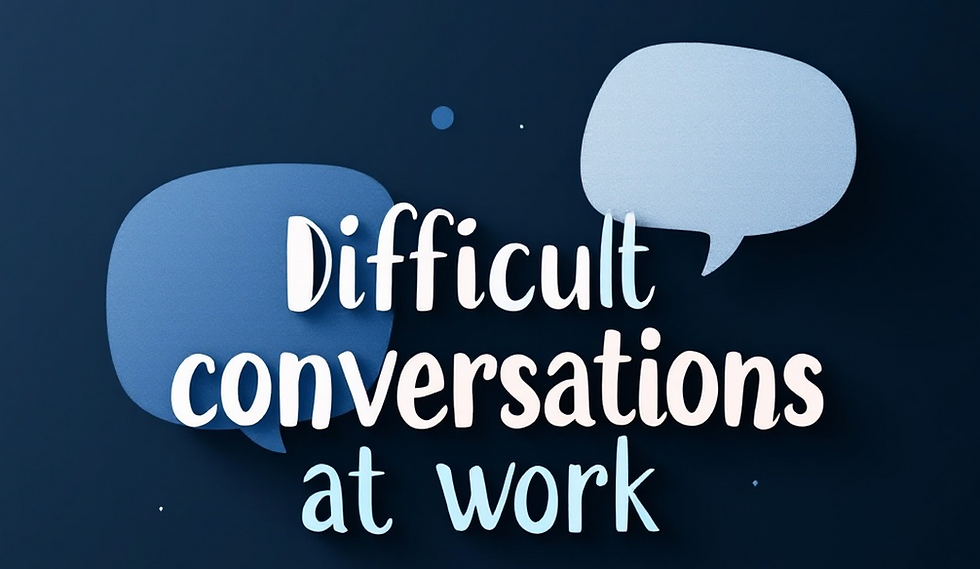The Hidden Forces Behind Our Workplace Conversations: What Really Stops Us from Speaking Up?
- Elevation Occ Psy

- Apr 6, 2025
- 4 min read

Have you ever felt that flutter in your stomach before a difficult workplace conversation? That moment when you know you need to speak up, but something holds you back? You're not alone.
As a business psychologist specialising in workplace conversations, I've spent the past 2 years diving deep into understanding why these moments feel so challenging—and what I've discovered might surprise you.
Through my PhD research, I've uncovered fascinating insights about what really drives (or prevents) those crucial workplace conversations. While we often think it's about having the right words or the perfect moment, the truth is far more intriguing.
The Emotional Elephant in the Room
Here's what shocked me most: when we analysed the data from 280 professionals across various industries, we discovered that our emotional responses—our fears, anxieties, and automatic reactions—account for an astounding 77% of what determines whether we'll have that difficult conversation.
Think about that for a moment. It's not our skill level, not our workplace environment, but our emotional landscape that primarily determines whether we speak up or stay silent.
The Science Behind Our Silence
Using the COM-B model (Capability, Opportunity, Motivation), we examined how different factors influence our workplace conversations. The results paint a fascinating picture of human behaviour:
Motivation: The Hidden Giant - Our automatic responses—those gut-level reactions we barely notice—emerged as the strongest predictor of conversation behaviour. Fear of negative consequences, anxiety about relationships, and emotional discomfort dominated participants' responses. As one participant shared, "I suffer from anxiety, and so I worry about having conversations that make me more anxious."
Capability: The Surprising Minor Player - Here's where it gets interesting: while we often focus on building communication skills and knowledge, our research showed that capability factors only explained an additional 0.6% of conversation behaviour. Yes, you read that right—less than 1%. This challenges the common approach of throwing more training at the problem.
Opportunity: The Contextual Puzzle Perhaps most surprisingly, opportunity factors—things like having the right time, place, or supportive culture—didn't significantly predict whether people would engage in difficult conversations. While participants frequently mentioned these barriers (particularly time constraints and lack of private space), they weren't the deciding factors in actual behaviour.
The Human Stories Behind the Numbers
Throughout our research, we heard countless stories that brought these findings to life. A healthcare professional described the paralysing fear of addressing performance issues with a colleague: "Fear that having the conversation will cause negative outcomes for my future career." An education sector worker shared their struggle with hierarchy: "My level in the company sometimes intimidates me, especially being on a fixed contract."
These narratives reveal a crucial truth: while we often focus on external barriers, it's our internal landscape that truly determines our actions.
Rethinking Workplace Communication
This research challenges us to fundamentally reconsider how we approach workplace conversations. If emotional barriers are the primary obstacle, why do we spend so much time on skill-building workshops whilst neglecting emotional readiness?
The Path Forward
Based on our findings, creating psychologically safe workplaces requires a multi-layered approach:
Understanding Our Emotional Triggers: Before we can address difficult conversations, we need to acknowledge and understand our emotional responses. What fears are holding us back? What past experiences shape our current reactions?
Building Emotional Readiness: Rather than focusing solely on communication techniques, we need to develop our emotional resilience and self-awareness. This might involve practices like mindfulness, emotional intelligence training, or coaching support.
Creating Psychological Safety: Organisations need to foster environments where people feel emotionally safe to speak up. This goes beyond physical space or policies—it's about creating a culture where vulnerability is valued and mistakes are seen as learning opportunities.
A Call to Action
As we conclude this exploration of workplace conversations, I invite you to reflect on your own experiences:
Reflection Questions:
When was the last time you avoided a difficult conversation? What emotions were really at play?
How might understanding the dominant role of emotional barriers change your approach to workplace discussions?
What would it take for you to feel emotionally safe having challenging conversations at work?
Taking Action:
Start noticing your automatic emotional responses to conversation opportunities
Challenge your assumptions about what's really holding you back
Begin building your emotional readiness through small, manageable steps
Share these insights with your colleagues and leaders to spark important discussions about psychological safety
Looking Ahead
The implications of this research extend far beyond individual conversations. They challenge us to reimagine workplace culture, leadership development, and organisational change. As we move forward, let's focus on creating environments where emotional safety is prioritised alongside professional development.
Your Voice Matters
I'd love to hear your thoughts and experiences.
How do these findings resonate with your workplace experiences?
What strategies have you found helpful in overcoming emotional barriers to difficult conversations?
Share your reflections in the comments below, or connect with me on LinkedIn to continue this important discussion.
Together, we can work towards creating workplaces where meaningful conversations flourish, and where speaking up feels less like a challenge and more like an opportunity for growth.
Remember: while the prospect of difficult conversations might never completely lose its emotional charge, understanding what truly drives our behaviour is the first step toward meaningful change.



Comments